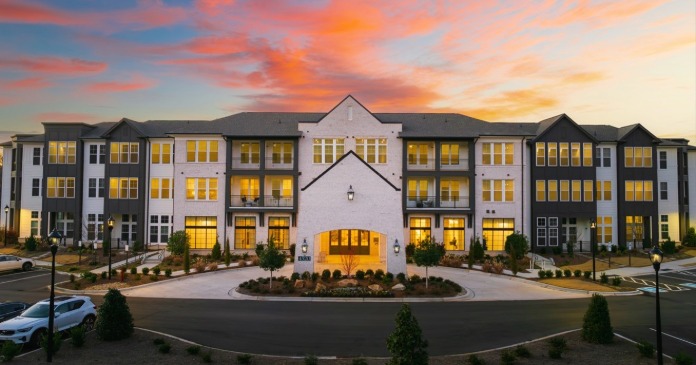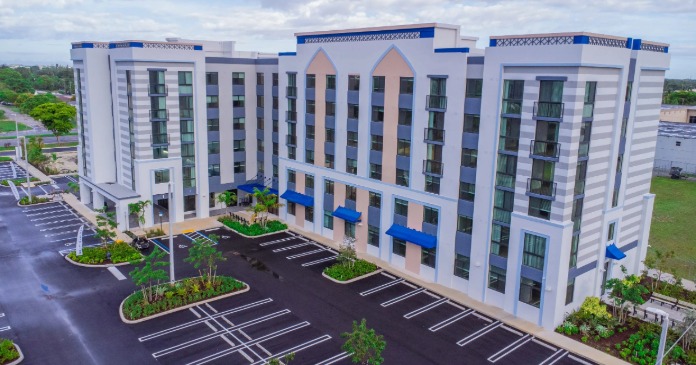Yield PRO TV presents Power Pros. Host Linda Hoffman talks with Dan Drees, Chief Growth Officer of AvidXchange.
Transcript: Power Pros interview. Linda Hoffman with Dan Drees, recorded August 20, 2021
(music)
Linda Hoffman: One word drives every apartment operation in the country: Performance. No matter the market, economic cycle or class of product—all business decisions begin with… how does this impact asset performance?
A lot goes into making today’s apartment business profitable. And like all of the world, technology has changed rental housing operations forever. The rental experience now includes nearly every facet of a resident’s life. Even work from home. An apartment is truly a whole life experience.
This means a lot of change for landlords. And with change comes opportunity. Narrow margins have given way to wide revenue streams. Multiple touch points allow owners to curate the resident experience.
One major touch point—financial transactions. The world expects real-time everything. The rise in online payments and the advantages this brings landlords has been a game changer. Topping the list of benefits: cash flow.
Property owners are always on the hunt for fast pay backs and streamlined processes. To this end, automating accounting and digitizing payments are a silver bullet.
It’s no wonder that service providers like Charlotte, North Carolina-based AvidXchange are in a constant growth state. A recent Fortune Business Insights report—including data from both Mastercard and PayPal—projects that the online payments market will reach nearly $18 billion by 2027.
So, it makes perfect sense that big hitters like MasterCard and PayPal founder Peter Thiel—among others—are invested in AvidXchange, a business payments processor.
What does this mean to multifamily owners and operators? What do we need to know about this shift in payments and automation in order to streamline operations at our properties?
Joining us today is someone who knows a great deal about such things. Dan Drees, chief growth officer of AvidXchange.
Dan, thanks for joining us.
Dan Drees: Thank you, Linda. It’s great to be here.
Linda Hoffman: What are the biggest trends in payment processing?
Dan Drees: Well, there’s a couple of them, I think. Even in just your quick summary there, I think you hit on a lot of what payment automation is trying to help with. And that is just the removal of the work that goes into to operating effectively. And that change, as you describe as well, is happening very, very fast.
But tucked inside of there—there are some really interesting, what I would call newer developments. I would say software is kind of the enabler of removing manual processes. Machine learning and AI are now transforming how the software actually works. In some of the examples of just how we can leverage machine learning and AI to actually read documents for us, begin to understand them, and then serve the right things up to us to make better, faster, easier decisions—that would be a really interesting one to talk a little more about.
I think the other thing that is happening right now is, frankly, a little bit of fatigue with technology changing. And the thing that I think I see, a little bit more of a future horizon, is this concept called, you know, digital resiliency. And it’s a little bit out there, but hang with me for a minute. I think right now people, when they hear about technology and they think about changing business processes, it becomes like this event where we have to put a bunch of time into it, perhaps even, you know, a lot of money into a one-time transformational change.
And what I’m seeing now in our most advanced customer base—really in all industries—is folks kind of thinking more ahead, trying to get all the right technology elements in place—it usually involves more than one partner. So, that the change can kind of be behind them. And the change can be more incremental, less impact on their people and more stable, so there’s not kind of these bigger events where we’re implementing a big technology change. Or rather, you are kind of snapping in and out smaller modules, if you will, that are simply adding value to particular teammates in the organization. So, those are the two big things for me: AI, machine learning, as much as software’s accelerating business change—I see that accelerating software.
Linda Hoffman: AvidXchange is an integrated with major PMS providers from MRI to RealPage. What’s the advantage to properties that add your solution to their existing PMS?
Dan Drees: Yeah, we love those guys. Great partners of ours. We have deep integrations with every one of them. What the value is, I think, if you’ve ever really examined how labor-intensive and paper intensive the payment process is, and frankly, the management of the bills that are in front of the payment process, you know that AP software, especially integrated with your existing systems, is first of all, just going to take a ton of work out. Okay? So, you’re going to get extra time for those teammates to be able to work on things, that frankly, have more value for the company, for the operation.
The second thing it does is deliver control, right? Like understanding where these things are: Where are the bills? Where is the money? Is it in budget? Did the right people see that bill? It just adds a lot of peace of mind to know that that the money coming out of operating accounts is going to the places that it was intended and is aligned to a bill that’s accurate, and is in line with an agreement you might’ve had with that particular supplier or vendor.
So that’s a big one. I think that if there’s third one, it is probably just around enabling the teammates to be able to deliver value better in their jobs and make their lives easier. So, all those things add up to productivity, but it’s a little more than just productivity.
Linda Hoffman: Implementing digital payments has a multi-faceted upside according to the Fortune Business Insights study. In addition to saving costs, it opens a window into consumer data. What does that mean to the world of property management?
Dan Drees: Yeah, well, part of digitizing these processes means that we have to just grab all the data. You can’t pay a bill unless you understand volume in units and price points on it. So, part of the work the software is doing is gathering that data.
What we’re finding now that we have these large amounts of data about transactions is they were able to leverage some of the same tooling we talked about before, to gain insights from that very data. I think a great example would be utility data. So, to get a utility bill paid, you need to extract all of the important parts of the bill—usage, amount, unit costs, total amounts, due dates, all that good stuff.
We let the software do a little bit of work, and the next thing you know, we’re actually identifying anomalies. So, we may see that a particular unit, or a particular building, all of a sudden has an energy costs that don’t seem in line with, maybe, where it was last year. Or, we detect simply a unit cost error from an energy company that might not have been caught in the fast-paced day-to-day world that we’re all operating under. So, again, a byproduct of a great AP process is having all the data. We just put some new tooling over the top of that data, and let it start telling us what we should look at and pay attention to. And, that’s another big game changer and it’s not just in utilities.
There’re some other interesting areas, as well.
Linda Hoffman: So, this is off-road. Do you integrate with Portfolio Manager?
Dan Drees: Do we integrate with Portfolio Manager? Yes, we do. And I think one of the bigger questions around integrations is how deeply do we integrate? So, our tooling is really flexible in that we can import files back and forth. We, as well as most of our customers, prefer API-based integration. And then in the best cases, we want every single piece of data that matters to be going back and forth in real time. And so, to the degree that we can move up that food chain, we have a better experience. And we’re always looking to improve those integrations. It’s one of the most important parts of the AvidXchange business.
Linda Hoffman: Apartment owners have an intense focus on ROI. Can you give us a fast calculation on the return for automated payment processing?
Dan Drees: Yeah. The first thing to think about is it’s not just the payment that’s going to drive improved ROI. It’s helping out with the processes that precede the payment. So, when you think about all those steps around receiving mail, receiving email and PDFs, sorting those from day one, routing those to the right people, quality checking them, printing things out, getting manual approvals, and you go all the way through into actually wet signatures for checks, if you’re not completely automated on ePayment. You think about all that work.
There’re a couple different studies that have benchmarked actual applied time for that, and it’s right around $19 per bill of applied time. After the AvidXchange software, we reduce that total cost to somewhere around $7, including the cost of the software. So, if you take all the time involved, it’s about $12 per bill that you will be saving in reduced human capital, reduced waste. That doesn’t even include fraud, which we often eliminate almost immediately, and can be large and that, I think, everyone listening would appreciate.
Linda Hoffman: Dan, you’re speaking property managers language
Dan Drees: I think is all our language.
Linda Hoffman: Absolutely. It’s becoming, certainly, if it wasn’t before. AvidXchange has a utility bill management product. This has become an area of intense interest for property operations and there’s a lot of competition. What sets your product apart?
Dan Drees: When I look at the different approaches that other companies have taken to manage this, I really like a lot of them. And in a lot of ways, AvidXchange is right in line with those. I think where AvidXchange kind of rises above a bit, is the fact that it’s integrated into a broader end-to-end AP management process. So, it’s not just about utility and the utility bill, but it’s allowing controller and AP managers to manage the entire spend. Because that’s how we think our customers think about it.
It’s a very important bill—that utility bill. We know what happens when we don’t catch it and we don’t it pay on time, so we don’t want to let that happen. But at the end of the day, we’re managing an entire business, so having it integrated to the overall AP ecosystem, and have that integrated back into their accounting system, and into the operation—we think puts us over the top.
Linda Hoffman: Can it be used stand-alone or must it be integrated with a PMS?
Dan Drees: You know it can, it can be absolutely leveraged standalone. I think you do lose out on some of that productivity of not having to re-key back into the PMS. But, yes, it could be run standalone.
Linda Hoffman: Sounds like a high level of sophistication.
Dan Drees: Yeah. It’s what is required to give value to our customers. So, we try to let the technology do the work, so that they can actually go do things that are more valuable and more important.
Linda Hoffman: State and local regulations, Dan, increasingly require multifamily operators to report energy consumption data using Energy Star’s Portfolio Manager. We talked about that a second ago and you said you’re fully integrated. How does AvidXchange ease this requirement?
Dan Drees: The first thing that we kind of talked about as an example, regarding just how data is becoming so important, where we talked through that utility example—First thing you’re going to need to get these certifications is to really just be able to understand the benchmark, what your usage is. It’s a significant part of what’s required to get and maintain your certification. And so what Avid Utilities is going to be able to do is exactly that—not only track usage but we’ll help you benchmark versus comparable properties, either in your set of properties, or elsewhere.
So that’s going to be a super important part of it, that Avid Utilities is really going to add value. We love to help people think through the overall strategy. This would only be one portion of that strategy for getting those certifications. But we really think it can help.
Linda Hoffman: So, Dan, let’s talk about the elephant in the room. How does COVID lay across multifamily operations, and what is AvidXchange’s part in all of that?
Dan Drees: Well, I think I think it can quickly turn into one of the major things that I’m seeing right now with our collective customer base and that is the fact that they really have a strong desire to be able to work from anywhere. Right? No longer are we in the middle of, you know, five days in the office, 8 to 5. Flexibility is at an all-time high. People’s personal safety is important. Everyone’s in a different risk bucket, and we want to want respect and appreciate that.
So, that means all of us need to have the toolsets available to get people data they need. And this is something that is probably one of the other things that we’ve seen coming out of, you know, what is essentially not a good thing, COVID. But what we have seen is it’s accelerating people’s use of software. So, that they can get the data to the people, wherever they are, and those folks can get their work done.
I’m not sure, Linda, if you’re seeing the same thing where your listeners and readers are requesting and requiring a lot about how they’re able to do that. We’re certainly seeing that a lot at AvidXchange.
Linda Hoffman: Well, that’s all the time we have today. Dan, thank you for joining us. We’ve only scratched the surface on this incredible new world of financial operations and what it means to apartments.
Apartment operations have become incredibly complex ecosystems. Owners understand that the meaning of great service has changed dramatically over the years. Creating a perfect resident experience begins with data and ends with a crafted collaboration of the best in class providers.
Follow these links to read more about AvidXchange and the Fortune Business Insights Report.
Thank you for joining us and see you on our next exciting episode of Power Pros.










